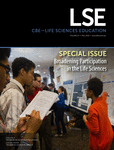Scientific Growth and Identity Development during a Postbaccalaureate Program: Results from a Multisite Qualitative Study
Abstract
This report builds upon our previous study, which described five patterns of why college graduates join National Institutes of Health (NIH)-funded diversity-focused Postbaccalaureate Research Education Programs (PREP). A 2015 report from the NIH showed that a high fraction of PREP participants matriculate into PhD and MD/PhD programs. This current study reveals how participants change during PREP, the program elements that facilitate change, and how identity as a graduate student and future scientist develops. Data come from in-depth interviews done at the beginning and end of PREP with 48 individuals from seven PREP programs. Results reveal three domains of development: academics, research, and presentation of oneself; each domain contains a developmental continuum. Key attributes of PREP enabling development include opportunities to attend graduate-level classes and seminars; time to practice reading literature; extended lab time with one’s own project; high and explicit expectations from mentors; and multiple opportunities to talk about science and improve communication skills. PREP enabled participants to develop their identities as graduate students and to anticipate being seen by others as highly prepared for PhD training. After PREP, 85% (n = 41) started the PhD or MD/PhD, making PREP an intervention approach with great potential to broaden participation in biomedical PhD programs.



